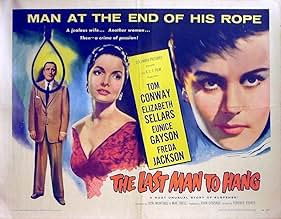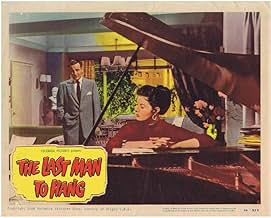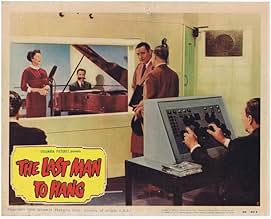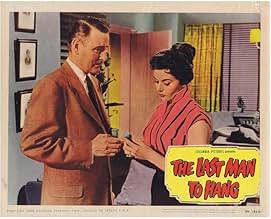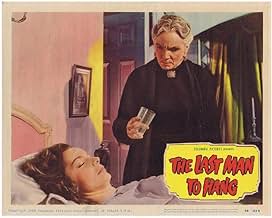Ajouter une intrigue dans votre langueSir Roderick Strood is on trial for the murder of his wife.Sir Roderick Strood is on trial for the murder of his wife.Sir Roderick Strood is on trial for the murder of his wife.
Avis en vedette
Well the film plot is appalling so why the 7/10? The plot calls for a mystifying added conclusion. Why? The film should have cut to the forgiving husband who accidentally killed his wife but we get something else, something mystifying in the extreme?
OK. Why the 7/10? It's for the court scene - very worthy and Vic Madden an unsung hero of the 20th c (gone far too soon). Did he ever act badly? Much more than a Sam Kydd type. This man was an actor. He should, perhaps, have struck out for fame instead he diversified. Taken too soon I believe a few more films and he would have been held today in the same high esteem of a Tom Courtney or a Freddy Jones.
The film about a man struggling to come to terms with self-blame of the death of his wife, is shallowed by the lead actor. Perhaps the last man to hang was indeed Tom Conway. Miss Sellers could have been asked for a POV, but alas it's now just too late! (RIP dear lady).
OK. Why the 7/10? It's for the court scene - very worthy and Vic Madden an unsung hero of the 20th c (gone far too soon). Did he ever act badly? Much more than a Sam Kydd type. This man was an actor. He should, perhaps, have struck out for fame instead he diversified. Taken too soon I believe a few more films and he would have been held today in the same high esteem of a Tom Courtney or a Freddy Jones.
The film about a man struggling to come to terms with self-blame of the death of his wife, is shallowed by the lead actor. Perhaps the last man to hang was indeed Tom Conway. Miss Sellers could have been asked for a POV, but alas it's now just too late! (RIP dear lady).
Had "The Last Man to Hang" not ending on an incredibly improbable and unnecessary twist, I probably would have given it an 8. It was well acted, realistic an very well written. But, with the twist ending, I think it dropped the film to an overall score of 6.
Roderick (Tom Conway) is married to a difficult and neurotic wife. Possibly as a result, he began an affair with another woman. The wife, when told later he wanted a divorce, behaved quite emotionally and irrationally...more so than would be usual in a case like this. Soon after, she is dead from an apparent overdose of a strong sleeping pill....and the husband is being charged for it, as he admits having given her a dose of sleeping pills. While he does not in any way deny this, he does deny that he knew she'd already been given a dose. In other words, he contends he never tried to kill her. It's a case of he says/she says and the film shows not just the events leading up to the trial but the trial and jury deliberations....as well as a completely unnecessary ending that was cool but wasn't logical...leaving MANY questions unanswered...too many to be an ending anyone could enjoy.
Up until the ending, I loved the film. Why, then, come up with such a ridiculous twist which actually contracts much of the film...or at least needs a lot of explaining...which you never got in the movie! Frustrating...especially when the rest of the production was so strong.
By the way, she film showed something that confused me and is perhaps a way that British and American juries differ. In one scene, before the case was handed to the jury to decide, they show the jurors in a room discussing the case and what they thought about Roderick's apparent guilt. If such a meeting and conversations occurred in an American trial, it would be grounds for a mistrial, as jurors are NOT allowed to discuss the case until the defense and prosecution have concluded. It is possible the American and British systems are the same and an editing error placed this scene in the wrong place....instead of about 10 minutes later. I just don't know.
Roderick (Tom Conway) is married to a difficult and neurotic wife. Possibly as a result, he began an affair with another woman. The wife, when told later he wanted a divorce, behaved quite emotionally and irrationally...more so than would be usual in a case like this. Soon after, she is dead from an apparent overdose of a strong sleeping pill....and the husband is being charged for it, as he admits having given her a dose of sleeping pills. While he does not in any way deny this, he does deny that he knew she'd already been given a dose. In other words, he contends he never tried to kill her. It's a case of he says/she says and the film shows not just the events leading up to the trial but the trial and jury deliberations....as well as a completely unnecessary ending that was cool but wasn't logical...leaving MANY questions unanswered...too many to be an ending anyone could enjoy.
Up until the ending, I loved the film. Why, then, come up with such a ridiculous twist which actually contracts much of the film...or at least needs a lot of explaining...which you never got in the movie! Frustrating...especially when the rest of the production was so strong.
By the way, she film showed something that confused me and is perhaps a way that British and American juries differ. In one scene, before the case was handed to the jury to decide, they show the jurors in a room discussing the case and what they thought about Roderick's apparent guilt. If such a meeting and conversations occurred in an American trial, it would be grounds for a mistrial, as jurors are NOT allowed to discuss the case until the defense and prosecution have concluded. It is possible the American and British systems are the same and an editing error placed this scene in the wrong place....instead of about 10 minutes later. I just don't know.
A very wooden, ageing Tim Conway, looks totally disinterested in his part and also makes little effort to engage the audience about his feelings towards his murdered wife. Since he seems to show little emotion about his own circumstances of being on trial for his life, and the fact that he 'wanders' through the film almost tight lipped, the film becomes lifeless and aimless! The only real interest comes in the courtroom scenes. Give this film a miss. A wasted opportunity of what could have been a dramatic and nail biting film. Instead it induces sleep!
If presented with this along with 'The Intimate Stranger' and 'Hell is a City', the Losey might prove tricky to pick out. Five years later Losey and Guest were still both making black & white thrillers (of which those by Guest probably had the edge) but Fisher was by now firmly established as a director of Technicolor morsels for Hammer; while at the time of this astringent courtroom drama he was the only one never to have worked in colour.
Like most British films of the era it has an extraordinary supporting cast; including fleeting appearances by John Schlesinger as a doctor called Goldfinger and an already worldly-looking young Gillian Lynne as Anthony Newley's girlfriend.
Like most British films of the era it has an extraordinary supporting cast; including fleeting appearances by John Schlesinger as a doctor called Goldfinger and an already worldly-looking young Gillian Lynne as Anthony Newley's girlfriend.
Directed by Terence Fisher, The Last Man to Hang from 1957 stars Tom Conway as a man accused of killing his wife Daphne (Elizabeth Sellars).
As others have pointed out, this was an okay film until the ridiculous twist at the end which made no sense. At all.
Conway plays Sir Roderick Strood, introduced to a soprano (Eunice Grayson) who is singing Lucia on the radio. He falls for her and wants to divorce his wife. At one point, he and Daphne fight and she pulls a gun, evidently to kill herself, which he wrestles away from her. The gun goes off, bringing the maid (Freda Jackson) who hates Strood. No one is hurt.
Strood gives Daphne sleeping tablets, and he is accused of killing her, since the maid had given her a sedative and claims he knew it.
We see the jurors receiving jury duty summons. One of them is Anthony Newley. You think it's going to be a story about the jurors.
This movie is all over the place. The end is terrible.
As others have pointed out, this was an okay film until the ridiculous twist at the end which made no sense. At all.
Conway plays Sir Roderick Strood, introduced to a soprano (Eunice Grayson) who is singing Lucia on the radio. He falls for her and wants to divorce his wife. At one point, he and Daphne fight and she pulls a gun, evidently to kill herself, which he wrestles away from her. The gun goes off, bringing the maid (Freda Jackson) who hates Strood. No one is hurt.
Strood gives Daphne sleeping tablets, and he is accused of killing her, since the maid had given her a sedative and claims he knew it.
We see the jurors receiving jury duty summons. One of them is Anthony Newley. You think it's going to be a story about the jurors.
This movie is all over the place. The end is terrible.
Le saviez-vous
- Anecdotes[Foreword] This film contains scenes that some viewers may find distressing.
- GaffesWhen Mrs. Tucker identifies the dead body of Daphne the body is breathing.
- Citations
The Jury At Home: Lucy's Mother: Oh - I wish your father had killed me and not left me here to die all alone!
Meilleurs choix
Connectez-vous pour évaluer et surveiller les recommandations personnalisées
Détails
- Durée1 heure 15 minutes
- Couleur
- Rapport de forme
- 1.85 : 1
Contribuer à cette page
Suggérer une modification ou ajouter du contenu manquant

